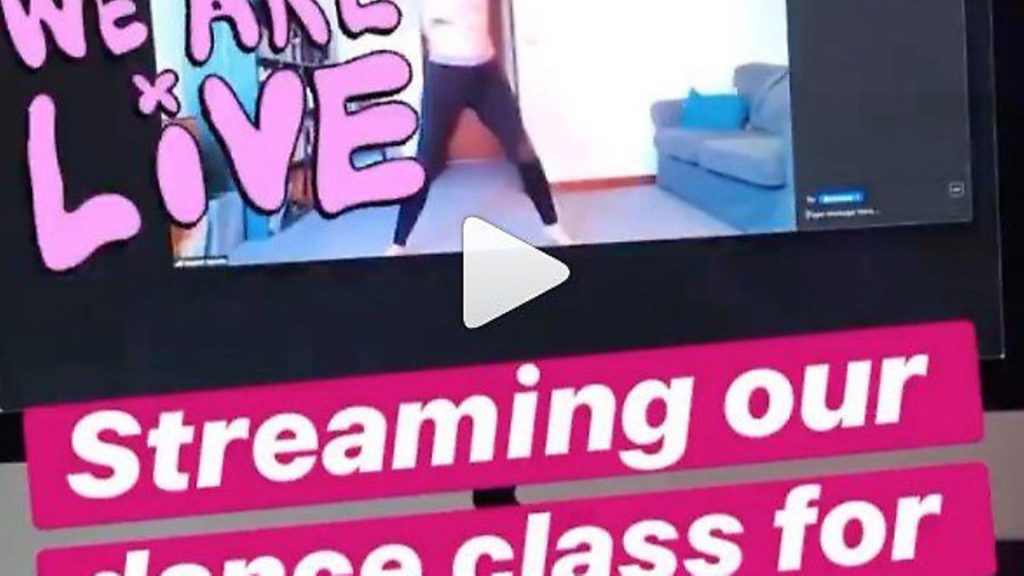
We have to try to find a language for us all in this alien world, says BONNIE GREER.

Something new and something very old… coronavirus may have changed our lives, forever, in two ways.
The new: the deep revelation of life online, and how much we all live and work there. WFH – ‘working from home’ – may become a permanent fixture.
Even broadcasters are doing it. Showing the books on the shelf behind you as you appear on television is becoming a thing.
Whether you use Skype or Cisco is interesting, too. We will all be doing it sometimes, sooner or later, as business recalibrates after various lockdowns.
The other thing that is being discovered is internet language itself. And its very ubiquity.
The United States Library of Congress – the equivalent of our British Library – recognises this. It holds a copy of the Gutenberg Bible – the 15th century version which was the earliest full-scale work printed in Europe using moveable type – and is also collecting the Lol Cat Bible, as part of an ongoing project to translate the Bible into ‘LOLspeak’, a form of vernacular English which has emerged online.
LOLspeak is meant to be funny and also a deviation from standard English. Just for the hell of it. It also uses slang. This internet play, this new language that some are using is such an adventurous and interesting mash-up of language that the library decided to collect it.
The Library of Congress project has become a catalogue of parts of internet culture itself. It is full of blogs no longer in existence; defunct web comics; old digital chat rooms, and other aspects of life online.
Have your say
Send your letters for publication to The New European by emailing letters@theneweuropean.co.uk and pick up an edition each Thursday for more comment and analysis. Find your nearest stockist here or subscribe to a print or digital edition for just £13. You can also join our readers' Facebook group to keep the discussion and debate going with thousands of fellow pro-Europeans.
The team assembling the data and assessing it gradually began to see how important the internet had become, how it was creating new cultures, new language, new ways of thinking.
The coronavirus lockdown drove those working on it home, enabling them to watch even more closely not only content, but how we humans create language itself.
This digital programme has been in existence since 2002, but now it has taken on a greater meaning as the pandemic has forced more and more of us to live online.
The criteria for selection in the digital archive is the same used by print archivists: relevance to future scholars and uniqueness.
But the content extinction rate of the internet causes the Library of Congress team to race against time. They have had to do things fast.
The earliest material featured in the archive is from the US general election in 2000. That was what most of the Baby Boomers and Gen Xers working on the project thought that the internet was for: just the collection of historic moments.
Collecting began to change after 9/11, when memorials and reminiscences began to appear online.
This led the team to collect around events like the Iraq War and the 2004 US election, not only data involving those historic moments, but also what people felt about them, too.
After that, the team decided to go big.
To collect everything. Especially comics.
The Library’s digital archive allows interesting websites that found themselves unable to stay in existence to find a way to stay alive. And that archive is now being used by some teachers to teach history.
As homeschooling becomes a factor that could take hold in the future, the internet and internet learning will become a key part. Parents and teachers will search for quality and accurate content and digital archives may be the answer.
In the autumn, I will be addressing the Conference of European National Librarians, and digital archiving will be part of my speech.
National libraries, holders of a nation’s written and thought legacies, have to find a way to determine whether their equivalent of LOLspeak is worthy of collection. Because internet language creation will not decrease. It could become more and more the way that we speak and see the world.
As silly as LOLspeak is, it also points the way to how the internet, online life itself, will become ubiquitous. Maybe what we begin to understand as ‘life’.
The real divide in the future will not only be rich and poor, but who has access to the web.
Those who can connect will be considered to be the ‘rich’, the educated. Those with poor connectivity or none, will be the ‘poor’ and uneducated.
Now to the old: this is purely anecdotal.
My first cousin twice removed, who I call my niece even though her grandmother is my first cousin, got in touch with me from Boston, Massachusetts. the other day.
She is a millennial, a grad student and typical of her age and education.
She got in contact with me not by email or text or Skype. She rang me.
She said that she just wanted to hear my voice, hear that I was ok. She told me that all of her uni friends were ringing one another up. Using a telephone to actually- just chat.
She told me that they were really enjoying doing that.
I was asked recently by another newspaper where I was and what I was doing the day, 50 years ago this month, that Paul McCartney casually said ‘no’ to the question of whether The Beatles were going to make another album. Paul also said simply ‘no’ when asked if he and John Lennon were going to work together again.
What every teen and young person did back then, on April 10, 1970, was to get on the phone. Phones then were so big and clunky that they were often used as murder weapons on Columbo.
Our phone had extensions, and the shock of Paul’s announcement drove me into a closet so that I could scream the news to my friends. I was at university then, but still not grown-up enough that I was not utterly shocked. I needed to share this earthquake with friends; hear their voices; know that they were with me on this day of infamy.
My niece at university told me that she just needed to make a connection that was human-to-human. She was also using the conference app Zoom to have little parties; and play her music to those she loved.
Suddenly, she told me, the internet was not just a mirror of her own self-involvement: it had become a way to truly connect, to cut through to what was true. And to who she loved.
Just as I hid in the family closet that day 50 years ago screaming the news to my friend, my niece wanted to hear the pauses in my voice; the rhythms. We humans are hard-wired to connect. Anyone who has held a newborn knows that they look you dead in the eye. That is the way that their brain is making sense of what is going on around them: connecting with another human being.
Dr Anthony Fauci, who is leading the fight against the coronavirus onslaught in the United States, has stated that handshaking might be a thing of the past. So might hugging. So might kissing.
But our need to create and express, our need to connect, will not cease.
The internet, and the human voice itself, will become more and more important as we face this Brave New World being laid bare before us.










